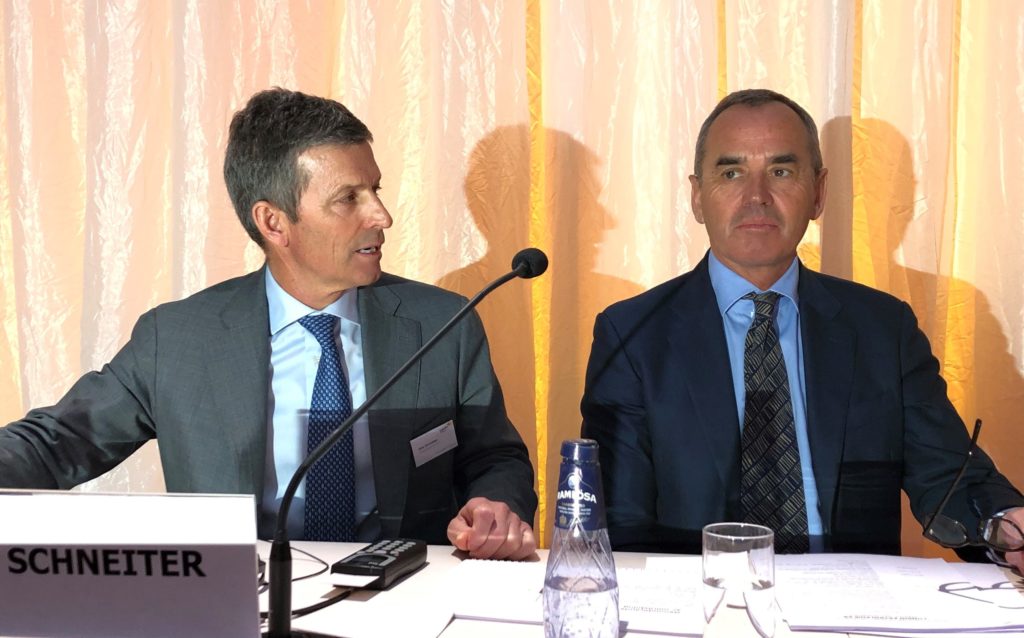The District Court has decided to resume the planning of the trial against Ian Lundin, Alex Schneiter and Lundin Energy AB. Ian Lundin and Lundin/Orrön Energy responded with an appeal to the Court to reject the indictment for failing to properly describe the alleged crimes. The timing of their claim – eleven months after the indictment and shortly before the first planning session – would be consistent with a legal strategy to delay procedures and undermine the integrity of the trial.
Court met to plan the trial
The District Court decided on 21 September that the planning of the trial against Ian Lundin and Alex Schneiter must proceed. The planning was adjourned last January pending the Supreme Court’s decision on whether Sweden has jurisdiction over Alex Schneiter. On October 20, the parties held a planning meeting at the District Court.
Prosecutor Henrik Attorps has repeatedly attempted to get the defence and the District Court to meet in order to proceed with the planning of the case, arguing that “it is unclear when a ruling from the Supreme Court can be expected. Even if the Supreme Court were to uphold Schneiter’s appeal, the indictment against Ian Lundin and the action against Lundin Energy AB remains”. Attorp highlighted that the case is “extremely extensive” and requires proper planning in order to protect the integrity of the trial. The defence have rejected all his requests. The District Court now agrees with the Prosecutor and confirms that the planning of the trial must resume. It notes that several meetings will be needed to prepare the case for the trial:
“At the first meeting, formal issues should be discussed, especially the time structure. The District Court will call for such a meeting shortly. A second meeting is preferably held after statement of the defence and evidence has been received. At the second meeting, the District Court intends to deal with the substance of the material and the approach to all parts of the indictment, as well as finally determine the planning of the trial”.
Risk of further delays? Lundin’s defence attacks the indictment
The defence have responded to the Court’s decision with a counterclaim that there are serious flaws in the description of the suspicions and that clarifications of the alleged crimes are needed. This argument has already been made in July 2021, when Alex Schneiter stated that Article 6(3) of the indictment infringes upon the European Convention on Human Rights because it does not sufficiently describe the alleged crimes. It was then rejected by the District Court.
In their latest application, the defence demands that the Prosecutor provides specification of the time, place and the other circumstances necessary for the characterization for each criminal act as well as each act of aiding and abetting (i.e. the way the defendants assisted in the completion of the crimes). This would be straightforward in a criminal case involving one specific act, such as assault or murder. However, the legal requirements differ when a case concerns multiple crimes committed during a long period of time. The Swedish Supreme Court established in the case NJA 1991 p. 83, that not every crime needs to be specified in those circumstances. In this case, the suspect was charged for having assaulted and raped his partner on multiple occasions. The description of the Suspicions read: “the suspect has on a very large number of occasions during the period summer 1987 to July 26, 1990, abused the plaintiff”, and “on a large number of occasions during the period forced the plaintiff to have intercourse”. This was deemed satisfactory. The court even stated that, “if it can be proven that a certain criminal act has been committed, it should not be seen as an absolute obstacle to a conviction that the time and place of the act could not be established with exact precision but rather to have taken place within a certain timespan.”
The defence’s claim ignores the distinct nature of international crimes. According to Miriam Ingesson, doctoral candidate in international criminal law at Uppsala University, ”When it comes to international criminal law, the framework and the definition of the crime itself provide the reasons to zoom even further out on the required level of detail in defining the criminal conduct in the charges. The point of international crimes is precisely to conceptualize criminal conduct on a macro level. A high level of specified detail regarding each and every one of thousands or potentially millions of victims is not possible and also not required in order to define the elements of the crime in the charges as such. Obviously, the Prosecutor still needs to substantiate the macro level elements using the totality of evidence presented in the proceedings that follow.”
The Prosecutor asserts that the provided level of detail satisfies all legal requirements and allows the defence to sufficiently prepare their defence. As usual in these types of cases, more information will be presented during in court and the defence will have ample opportunity to respond. The District Court is expected to decide the matter shortly.
Timing of request
The Prosecutor highlights the odd timing of this request. When the defendants were provided with a preliminary statement of the criminals acts in spring of 2021, they wrote that the description of suspicions was too vague and they would object in case of an indictment. Why did they wait eleven months to submit their claim? Possibly because the proceedings are finally moving forward now that the District Court has decided that the planning of the trial must resume and the Supreme Court is about to decide whether Sweden has jurisdiction over Alex Schneiter. The timing of the claim certainly maximises the delays that it can cause. Prosecutor Henrik Attorps has meanwhile asked the Court to consider the odd timing of the request when making their decision.
Apart from the dubious legal merit of the suspects’ legal actions, they are undermining the integrity of the trial, which confirms Lundin’s indifference towards victims of war crimes who have been waiting for over 20 years to see justice done.



